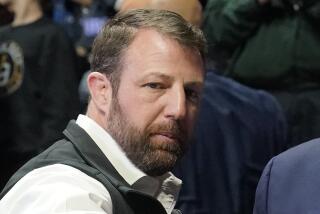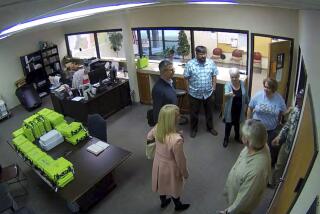Ex-Official Says Cranston Lied About Bid to Aid S
- Share via
WASHINGTON — Edwin J. Gray, former chairman of the Federal Home Loan Bank Board, accused Sen. Alan Cranston (D-Calif.) Tuesday of lying about a 1987 meeting in which four senators allegedly sought to interfere with federal oversight of Lincoln Savings & Loan of Irvine, Calif.
Gray, who headed the bank board until June, 1987, told the House Banking Committee also that the actions of Cranston and the three other senators were “more egregious” than anything former Speaker Jim Wright (D-Tex.) had done on behalf of failing savings and loan institutions in Texas. Wright was forced to resign this year as a result of his alleged unethical behavior, although he was cleared of charges involving his efforts to aid Texas thrifts.
Much of Gray’s six hours of testimony focused on an April 2, 1987, meeting in which Cranston and Sens. Dennis DeConcini (D-Ariz.), John McCain (R-Ariz.) and John Glenn (D-Ohio) allegedly asked Gray to withdraw a regulation opposed by Lincoln owner Charles H. Keating Jr. All four senators had previously received big campaign donations from Keating.
At the time of the meeting, Lincoln was under investigation by federal regulators. Gray and other critics contend that the pressure Keating brought to bear on the government during that period caused the bank board to delay federal seizure of Lincoln until last April. During that two-year period, they maintain, Lincoln was able to squander as much as $2 billion in federally insured deposits.
Gray’s anger at Cranston apparently stemmed from the senator’s statement on Sept. 28 that the former bank board chairman had “either fabricated or misunderstood what occurred in that room, and I don’t know which it is.”
“Sen. Alan Cranston said I was either lying or had a bad memory,” said Gray in his lengthy prepared testimony. “But, unfortunately, he is the untruthful one in this matter.”
Cranston was not available to comment on Gray’s accusation, but his press secretary, Murray Flander, denied that the senator had lied. He noted that Cranston has already acknowledged that he did “a pretty stupid thing, politically,” by attending the April 2 meeting.
Prior to the meeting, Keating, a prominent Republican, had raised $47,000 in campaign contributions for Cranston. The senator had also persuaded the Arizona businessman to contribute $850,000 to voter registration organizations he had founded and $85,000 to the California Democratic Party.
Cranston has said that he told Gray during the April 2 meeting that the government either should indict Keating for wrongdoing or drop the investigation of Lincoln. But Gray specifically challenged that statement by Cranston. “This is untruthful,” he said. “Cranston said nothing of the kind.”
The former bank board chairman cited a series of other quotations from Cranston since last May that, taken together, suggest that the senator over the last six months may have altered his version of what happened at the April 2 meeting.
Originally, Cranston had said he was “astonished” by Gray’s contention that DeConcini had asked the bank board chief to withdraw a regulation opposed by Keating. But, more recently, Cranston has said that there “may well have” been some discussion of whether the board should withdraw the regulation restricting direct investments by thrifts in real estate projects.
“Sen. Alan Cranston has changed his story about his attempt to intervene on behalf of Lincoln Savings & Loan,” Gray said. After noting that DeConcini also has disagreed with Gray’s characterization of the meeting, he added: “ . . . Someone is not telling the truth here.”
Cranston has said that he does not recall exactly what DeConcini said during the meeting, according to Flander. But the press secretary acknowledged that Cranston’s statements changed slightly after he recently read a transcript of a subsequent meeting on April 9, 1987, in which the four senators, joined by Sen. Donald W. Riegle Jr. (D-Mich.), met with bank board regulators from San Francisco who were investigating Lincoln.
DeConcini asked for the regulation to be withdrawn at the April 9 meeting, according to the transcript.
Neither Cranston nor any of the other senators who attended the April 2 meeting disagreed with DeConcini’s statements, according to Gray. And, although Cranston did not sit through the second meeting, he appeared briefly. The transcript shows that he said: “I just want to say that I share the concerns of the other senators on the subject.”
Gray acknowledged that Cranston let his colleagues do most of the talking during the first meeting as well. “Cranston didn’t say very much,” he said. “Most of his time was spent listening.”
House Democrats, who still are nursing painful memories of the ouster of Wright earlier this year, were clearly stunned by Gray’s comparison of the senators to the former Speaker. Although Wright departed after the House Ethics Committee found evidence that he had violated certain rules, he actually was cleared of charges stemming from his intervention with the bank board on behalf of Texas thrifts.
“I consider this to be more egregious than the interventions with me by former House Speaker Jim Wright,” Gray declared. “No member of Congress ever asked me to withdraw an adopted regulation until that April 2 meeting in Sen. DeConcini’s office. Worse yet, it was requested by four U.S. senators in private, behind closed doors, according to plan.
“They did not believe this single effort to subvert the regulatory process for their wealthy friend and contributor would ever come to light. They cannot bear to tell the truth about it . . . .”
Flander characterized Gray’s prepared testimony as a “rambling 10,000-word document of political paranoia” that reflects the former chairman’s “feeling that he was the only righteous man that walked on earth” and that Keating was out to get him.
Indeed, Gray acknowledged that he felt uneasy about attending the April 2 meeting. Not only had he been asked to come to DeConcini’s office without any staff members, but Lincoln had sued the bank board only two weeks earlier and Keating had tried to “buy” him with a job offer, he said. He said he has since learned that Keating was prepared to pay him $300,000.
Gray said it was clear to him that the four senators had already “bought off” on a scheme devised by Keating to convince people that regulators were carrying out a “vendetta” against Lincoln because of its reputation as a high-flying thrift with risky investments.
He charged that the money these senators received from Keating “had long since put them in the right frame of mind” to accept the idea that the board was carrying out a vendetta against Lincoln.
Cranston has denied that he intervened because of the donations he had received from Keating.
Gray said DeConcini was so indebted to Keating that he even pledged to the Ronald Reagan Administration to vote in favor of assistance to the Nicaraguan rebels in 1986 in exchange for getting a Lincoln stockholder, Lee H. Hinkel, appointed to the bank board.
Gray offered as additional evidence of Keating’s efforts to buy influence in Washington the claim that former SEC Commissioner Barbara Thomas had approached his top aide at the bank board in 1987 seeking to learn what evidence federal investigators had against Lincoln.
According to Gray’s aide, Shannon Fairbanks, the approach took place at a time when Thomas was being offered a position by Keating on the board of American Continental Corp., the parent company of Lincoln.
Fairbanks said she told Thomas nothing because it would have been illegal to divulge the information, and Gray said he dismissed it as just another improper act by Keating.
Keating has been subpoenaed to testify before the committee later this month, but Chairman Henry B. Gonzalez (D-Tex.) has said he does not intend to take testimony from the senators unless they volunteer to appear. So far, none of the senators have offered to testify.
More to Read
Get the L.A. Times Politics newsletter
Deeply reported insights into legislation, politics and policy from Sacramento, Washington and beyond. In your inbox twice per week.
You may occasionally receive promotional content from the Los Angeles Times.










